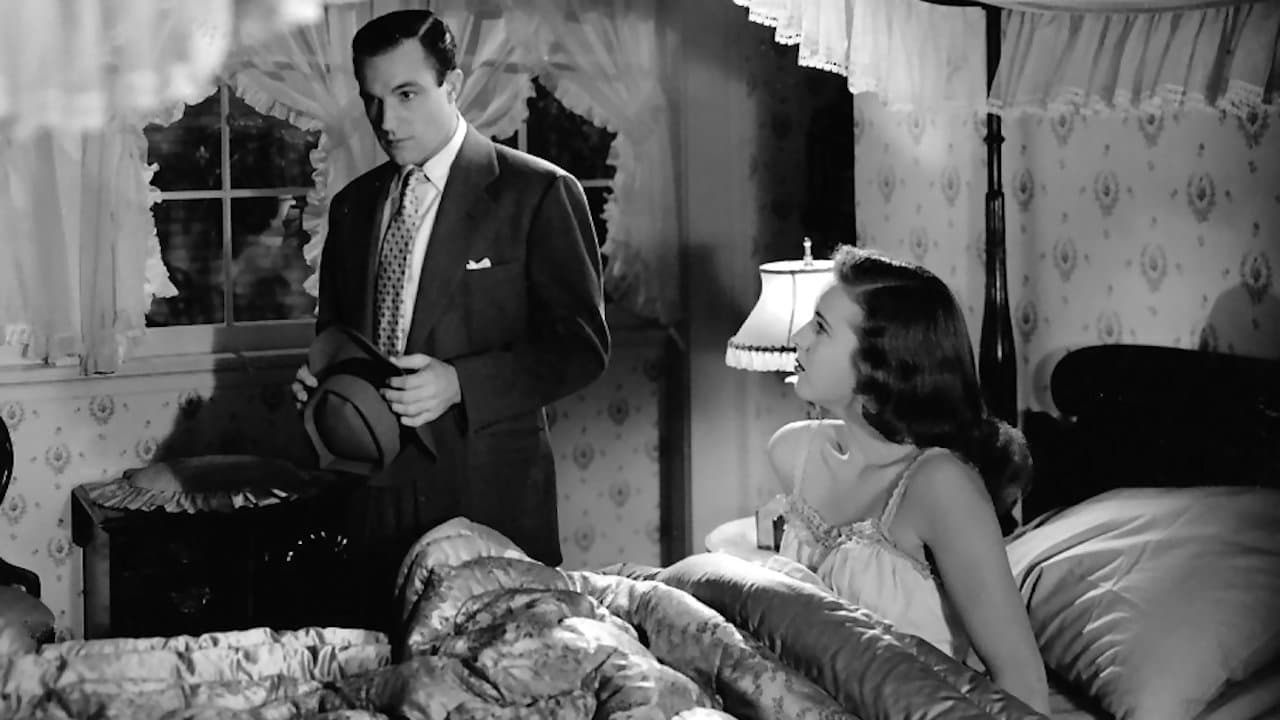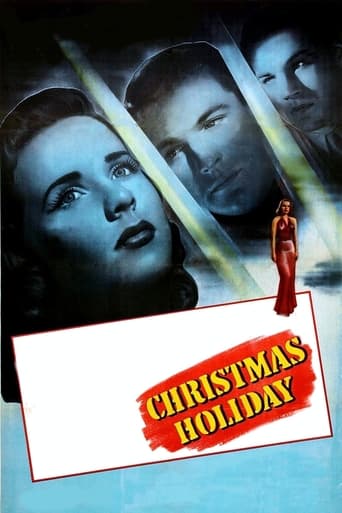ChicDragon
It's a mild crowd pleaser for people who are exhausted by blockbusters.
Fatma Suarez
The movie's neither hopeful in contrived ways, nor hopeless in different contrived ways. Somehow it manages to be wonderful
Beulah Bram
A film of deceptively outspoken contemporary relevance, this is cinema at its most alert, alarming and alive.
Haven Kaycee
It is encouraging that the film ends so strongly.Otherwise, it wouldn't have been a particularly memorable film
mark.waltz
Between Deanna Durbin, Gene Kelly and Gale Sondergaard, the realm of talent is incredibly high. What is missing is a sensible structure, a fully believable script and enough motivation to make thus work. There are confusing starts and finishes, flashbacks out of sequence, and a blaze way of presenting the facts and characters. It starts off with characters unrelated to the three leading characters flying into a storm for the titled Christmas holiday, and it is there where the title and its relevance ends. Spring may have been a little late that year, to paraphrase the Frank Loesser song that Durbin sings, but the script and its sensibility never seemed to arrive.The main plot involves Kelly meeting Durbin at a concert, their courtship and sudden marriage, and the twist that Kelly is a sociopathical killer. Sondergaard, as his loyal mother, initially praises Durbin for her seemingly indestructible strength (indicating that she knows that there's something horribly wrong with her son), but when Durbin disappoints her, only a slap across the face seems to be warranted. The scenes between Kelly and Sondergaard suggests a mother love that goes way beyond reality, while Kelly and Durbin totally lack any sort of heat to make their whirlwind romance believable.Perhaps better to be viewed as a character study than as a plot oriented film, this is a disappointing film noir directed by one of the best (Robert Siodmark). One flashback within a convoluted narrative is plenty, but this takes it way overboard. Gladys George and Richard Whorf try to fit in to the bookends of the main story but the results are unsatisfactory. Hearing Durbin sing the Irving Berlin classic, "Always", is a nice touch, but ultimately, this is a Christmas holiday that ain't so merry.
MartinHafer
I would consider this among Deanna Durbins' more disappointing films. As I watched it, I seriously wondered if the film was originally just the portion with Gene Kelly and the other plot involving the soldier was done as an afterthought. In hindsight, this was a mistake and the soldier's story really wasn't necessary to this clumsy movie.When the film begins, a Lieutenant serving in WWII gets a dear John letter from his sweetie. Naturally he's hurt and angry...and this occurs just before he goes on leave. However, during the leave, he is diverted to New Orleans and is stuck there...and he meets Abigail (Durbin). She then tells him about her experience with love...and it consists of a series of flashbacks with her then husband (Gene Kelly)...a man who is a total scum-bag. The ending of the film, is very abrupt and you wonder what the studio was thinking.Overall, a disappointing and slightly confusing film...one that made you wonder, as Durbin was one of the studio's biggest assets and deserved a better picture than this.
adamshl
What a surprise treat to see this rare film as part of a Robert Siodmak Festival at the Cleveland Art Museum in the summer of 2014. It put me back in the mid-WWII period and the beautiful, pristine 35mm print was shown as originally presented on the big screen, thanks to Film Curator John Ewing. The major attraction here is that Deanna Durbin and Gene Kelly both play against type in a "doctored up" Somerset Maugham story. Siodmak direction is dark, atmospheric and smoothly executed throughout. Deanna sings Irving Berlin's "Always" in a pop style very effectively. A good portion of Wagner's "Liebestod" from Tristan and Isolde is heard in an orchestral setting to heighten the dramatic proceedings.Both stars work surprisingly well in their very heavy roles, and I found myself glued to the screen during Durbin's depiction. Her acting style has often been subtle, and this performance was one of her most understated. Kelly's role challenged him to reach dramatic heights, and he rises to occasion.While some of the script is dated, Deanna dominates the screen whenever she's on, and is matched by a fine supporting cast. Truly a worthwhile viewing.
MARIO GAUCI
This is a strange noir, made even more so by the odd casting of the usually wholesome Deanna Durbin and Gene Kelly as a barely-disguised 'floozie' and an inveterate gambler and murderer respectively! Besides, the title is most ironic since, while it does revolve around just that occasion, the main narrative (which unfolds in flashback, a typical genre device, I might add) hardly evokes a feeling of good cheer – incidentally, this is possibly the only film set around this time of year to depict the Midnight mass traditionally held on Christmas Eve! Christmas HOLIDAY, then, was only director Siodmak's second noir: the result is somewhat pretentious for a movie from this vintage, yet this very quality has helped render it less dated than others of its ilk! I should point out that the late eminent British film critic Leslie Halliwell resented the script's approach to the source material – but, while this is unusually billed in the opening credits as "W. Somerset Maugham's Christmas HOLIDAY as written by Herman J. Mankieiwicz", the author himself was reportedly enthusiastic about the screen rendition!For the record, I own 10 vehicles by the female lead (who actually initiated the project in an effort to change her child-star image!) but, more by accident than design, this is the first I have watched – and it appears that, not only was the film her personal favorite but also, in her opinion, the only worthy one she ever did! Incidentally, she would again dabble in the thriller genre with the more modest but still interestingly-cast LADY ON A TRAIN (1945), which I do have a copy of. By the way, the actress (who retired from the screen way back in 1948!) has just turned a venerable 90 years old in December! With respect to Kelly, this was his seventh picture (having debuted just 2 years previously) and, in his case, too, he would appear in only one other title in this vein i.e. BLACK HAND (1950), which I have also acquired some time back but have yet to catch up with. As for how the two fare within this seedy/gloomy environment, Kelly is quite good as a ne'er-do-well but Durbin (even though the studio bosses forced her into a couple of numbers – Frank Loesser's "Spring Will Be A Little Late This Year" and Irving Berlin's "Always", with the latter essentially turned into a motif throughout – to appease her established fan-base!) is surprisingly excellent.Anyway, the plot involves Durbin and Kelly meeting at a concert (the 'Love/Death' theme from Richard Wagner's opera "Tristan And Isolde" – also effectively reprised here for the finale – which, for my money, has been immortalized in two Luis Bunuel films!) and immediately falling in love. When he takes her home to meet his mother (Gale Sondergaard in one of her best roles), the latter realizes the girl (who obviously is unaware of his character foibles) can help her make an honest man of her boy. However, events take a tragic turn as Kelly kills a man in a dispute over money, is caught, tried and condemned. Sondergaard, whose feelings for her son go far beyond motherly love(!), takes it out on Durbin for having failed her – which sends Durbin on her path to perdition (self-imposed, really, so as to be herself in a prison of her own making!)…which is how we first see her, offering solace at a New Orleans "joint" to a soldier who has his own beef against love (in fact, he was on his way home to take revenge upon the fiancée who had just jilted him!).Other prominent characters are the proverbial madam-with-a-heart-of-gold played by Gladys George and Richard Whorf as the sleaziest figure of all, a muck-racking reporter who also operates as something of a pimp in the latter's establishment! The climax, then, sees Kelly escape from prison and (understandably) misconstruing Durbin's particular method of expiation: however, the Law is soon on his tracks, and he dies in a shoot-out with the Police – his dying words to his wife, finally appreciating the nature of her sacrifice, are "You can let go now, Abigail" (promptly reiterated by the young soldier, looking on).

